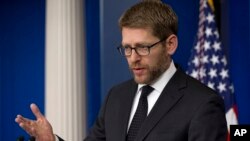WHITE HOUSE —
Violence and escalating sectarian tensions are of increasing concern to President Obama, who according to his spokesman has been spending an increasing amount of time focused on Iraq.
Jay Carney says the president wants military assistance provided as quickly as possible. That aid includes 100 Hellfire missiles, surveillance drones and Apache helicopters.
But since Prime Minister Nouri al-Maliki's U.S. visit last November, lawmakers in Congress skeptical about the Iraqi leader's commitment to political reconciliation, and how aid would be used, have blocked the helicopters.
Democratic Senator Robert Menendez, who chairs the Senate Foreign Relations Committee, is prominent among those voicing concerns.
Republican Speaker of the House of Representatives John Boehner suggested Thursday that President Obama has not been sufficiently personally engaged on Iraq.
Boehner renewed a line of criticism heard chiefly from Republicans that blames the president for failing to achieve an agreement on leaving a residual U.S. force in Iraq.
"Starting with the president delegating his responsibilities to the vice president, the administration has chosen to spend much of its time and energy trying to explain why having terrorists holding key terrain in the Middle East is not the president's problem," said Boehner. He added, "The United States has and will continue to have vital national interests in Iraq. We must maintain a long-term commitment to a successful outcome there. And it is time that the president recognize this and get engaged."
That is an "inaccurate representation," said Jay Carney. Vice President Biden has generally overseen Iraq policy, but Carney said Mr. Obama is "very engaged" and working with Congress to accelerate arms shipments.
"When the president asked the vice president to oversee Iraq policy when they came into office in early 2009, that was widely viewed as a demonstration of the fact that the president took the need to move forward in Iraq and to wind down that war so seriously. He brought it right into the West Wing, and that is where it resides today," said Carney.
Republican Senator John McCain suggested Thursday that the withdrawal of U.S. troops in 2011 left the U.S. less able to influence the Maliki government.
"I do blame Prime Minister Maliki. Responsibility lies with his behavior towards the Sunni; but we were not there to influence him. We were not there."
Pressed by reporters about whether he favors sending U.S. troops back to Iraq, John Boehner said he does not think "that is called for at this time." President Obama has ruled out a return of U.S. troops.
A Senate aide told VOA that after months of delay, the State Department has now indicated it is moving forward to respond to two key congressional concerns.
One involves assurances on how helicopters leased by Iraq's government would be used.
Another involves ongoing U.S. concerns about Iraq exerting tighter control over its airspace to prevent Iran from sending military equipment to Syria's government.
Jay Carney says the president wants military assistance provided as quickly as possible. That aid includes 100 Hellfire missiles, surveillance drones and Apache helicopters.
But since Prime Minister Nouri al-Maliki's U.S. visit last November, lawmakers in Congress skeptical about the Iraqi leader's commitment to political reconciliation, and how aid would be used, have blocked the helicopters.
Democratic Senator Robert Menendez, who chairs the Senate Foreign Relations Committee, is prominent among those voicing concerns.
Republican Speaker of the House of Representatives John Boehner suggested Thursday that President Obama has not been sufficiently personally engaged on Iraq.
Boehner renewed a line of criticism heard chiefly from Republicans that blames the president for failing to achieve an agreement on leaving a residual U.S. force in Iraq.
"Starting with the president delegating his responsibilities to the vice president, the administration has chosen to spend much of its time and energy trying to explain why having terrorists holding key terrain in the Middle East is not the president's problem," said Boehner. He added, "The United States has and will continue to have vital national interests in Iraq. We must maintain a long-term commitment to a successful outcome there. And it is time that the president recognize this and get engaged."
That is an "inaccurate representation," said Jay Carney. Vice President Biden has generally overseen Iraq policy, but Carney said Mr. Obama is "very engaged" and working with Congress to accelerate arms shipments.
"When the president asked the vice president to oversee Iraq policy when they came into office in early 2009, that was widely viewed as a demonstration of the fact that the president took the need to move forward in Iraq and to wind down that war so seriously. He brought it right into the West Wing, and that is where it resides today," said Carney.
Republican Senator John McCain suggested Thursday that the withdrawal of U.S. troops in 2011 left the U.S. less able to influence the Maliki government.
"I do blame Prime Minister Maliki. Responsibility lies with his behavior towards the Sunni; but we were not there to influence him. We were not there."
Pressed by reporters about whether he favors sending U.S. troops back to Iraq, John Boehner said he does not think "that is called for at this time." President Obama has ruled out a return of U.S. troops.
A Senate aide told VOA that after months of delay, the State Department has now indicated it is moving forward to respond to two key congressional concerns.
One involves assurances on how helicopters leased by Iraq's government would be used.
Another involves ongoing U.S. concerns about Iraq exerting tighter control over its airspace to prevent Iran from sending military equipment to Syria's government.





